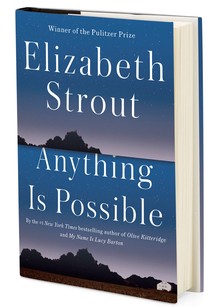The
Olive Kitteridge author goes home again. Generations of readers have been fed the notion that a literary tour de force must be showy, but Elizabeth Strout's newest novel,
Anything Is Possible, proves just the opposite. With a plain voice and a bountiful spirit, Strout paints the full array of emotion from despair to delight on a small canvas, with no plot pyrotechnics to get in the way. The narrative centerpiece of this book is another book, a memoir by the fictional Lucy Barton (first seen in Strout's 2016
My Name Is Lucy Barton). Lucy, who returns as an adult to the rural Illinois hometown where she started out in brutal deprivation, is the tenuous link between titled chapters that read like short stories, tiny jewel boxes filled with secrets. With the exception of a murder that happens offstage, few of these are the stuff of big headlines. Rather, Strout trains her writerly gift on incidents that are anything but epic. For her, it's the everyday of fragile human lives that matters most. She reveals, and often forgives, the wronged, the disturbed, the foolish and the maimed—the whole terrain of the "estranged, expatriated heart." Each character in her own way must accept the burden of her interdependence. Strout makes these souls real: They are our townspeople, and we are theirs.


